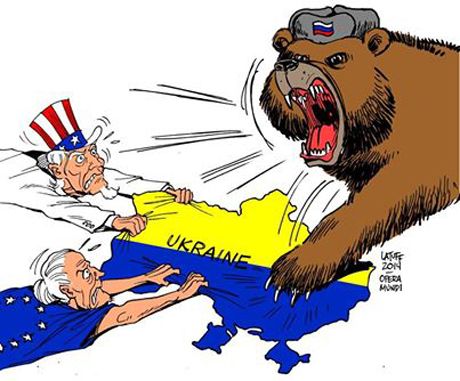What we think
You are here
Hands off Ukraine, Russia and NATO out!

March 5, 2014
The current crisis in the Ukraine is a product of decades of meddling by both the West and Russia in the affairs of the country.
After the collapse of the Eastern Bloc, NATO countries were keen to exercise as much control as possible over the economics of the former soviet satellites. The initial IMF “shock treatment” for the Ukraine was devastating for the economy and the current EU and IMF sponsored “rescue packages” for the Ukraine will no doubt follow a similar pattern of gutting social services and privatization.
Ukraine
Russia, for its part, was deeply concerned about a NATO drive to surround it, and has exerted what influence it can over the Ukraine and the other former Soviet states. Russia has done this through a series of mechanisms but the chief weapon in its arsenal is the manipulation of gas supplies. In 2006 and 2009, Russia cut off gas to the Ukraine, causing economic crisis.
The result of all this is that the Ukraine is bankrupt and facing a social crisis. Youth unemployment is at roughly 20 per cent and under employment is also rampant. The people of the Ukraine have fought numerous times to try and find a government that will do more to take care of the people, but both the Western sponsored opposition and the Russian supported government of Yanukovich were incapable of meeting those demands. This is the immediate context for the uprisings against the government that have resulted in the current situation.
Inter-imperial rivalry
Russia was not imagining things when it perceived that NATO intended to surround the country. The plans by the US to build missile defence installations in Ukraine were an attempt to isolate Russia militarily. The end of the Cold War may have been heralded as the “end of history” but it didn’t stop the drive towards imperial accumulation by either the West or Russia. We have seen many flashpoints over the years such as the Russian war to take south Ossetia in 2008. That inter-imperialist rivalry is still going strong.
The US is concerned that a rival economic and military bloc is being created with the Russian and the Chinese governments signing pacts under the Shanghai cooperation organization. The SCO is also expanding and has invited both India and Pakistan to join. This new bloc is the main reason that US president Obama has called for a pivot to Asia to curtail any expansionist designs from the SCO.
At this point it seems unlikely that NATO will use military force against Russia but that may change. The main European partners in NATO have extensive economic ties with Russia, and western European countries are reliant on Russia for 40 per cent of their natural gas. In fact, it seems that western Europe isn't even interested in sanctions. But this could change; economic integration isn't always a deterrent to war but frequently ends up stoking tensions. It is a central dynamic in capitalism that competition for resources and markets drives conflict between states. As economic crisis continues around the world there will be more flash points.
Neither Washington nor Moscow
For the left in the west our tasks are clear. We need to stop our governments from interfering in the affairs of the Ukraine. We know that when the Johns—that is Baird, Kerry and McCain—speak about bringing democracy and rule of law, that they are only doing so to advance their own states strategic interests.
We also need to support the left in the country that is attempting to build an alternative vision for the future. They are doing so under huge pressure from the far right fascist groups and in the context of the legacy of Stalinism, which makes their jobs even harder. But they are organizing and the current political crisis provides an opening to advance different ideas. Each of the left groups has their own interpretation of the current events but many have raised the slogan "neither Washington nor Moscow."
As Russia feels more confidence in challenging the West, and the economy of the NATO countries continue to deteriorate, that slogan will be ever more important.
Section:









